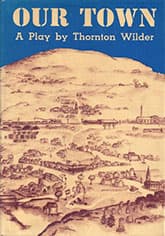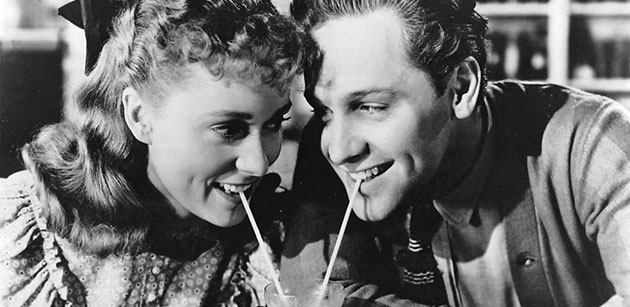Our Town
Critique • Quotes • At the movies
 First edition
First editionOur Town
First performance
1938, Princeton, New Jersey
Literature form
Play
Genres
Tragedy, meta-theatre
Writing language
English
Author's country
United States
Length
Three acts, approx. 18,500 words

Our Town film plays up the love story of Emily (Martha Scott) and George (William Holden).
The walls of our town
Our Town (1940): Film, 90 minutes, director Sam Wood; writer Harry Chandlee, Frank Craven, Thornton Wilder; featuring Craven, Martha Scott, William Holden, Fay Bainter, Beulah Bondi, Thomas Mitchell
In addition to being produced for the stage scores of times across the United States and around the world, Thornton Wilder's play Our Town has been adapted for radio, television, opera, ballet and several films.
The films, at least, often have a problem with the meta-theatrical aspects of the play — breaking the fourth wall, the lack of props and scenery, jumping around in time.... As well as with the pessimistic conclusion, the tragedy of life as revealed in the last act.
The cinematic versions of Our Town vary in their response to these issues. We'll look at two quite different approaches.
The first film adaptation of Our Town in 1940 is a Hollywood movie, sure enough.
Directed by studio hit-maker Sam Wood, the film is still stagey in its overall feeling, like a lot of the early sound films of the 1930s. But its sensibility is somewhere between any actual stage production of the play and the usual Hollywood movie of its time.
The "Stage Manager", played by Frank Craven who originated the role on Broadway two years earlier and had a hand in rewriting the play for film, still narrates and still fills in for minor characters. Though the effect of his talking to the audience is overshadowed by other aspects of the production.
For one thing, the film uses plentiful scenery, props and even some long background shots. Little imagination is needed for the viewer to see the small town of Grover's Corners. We don't need as much of what's going on explained to us, nor have the actors mime their actions. When the kids are sharing dreams from upper-floor bedroom windows, they're gazing out actual high, open windows, as opposed to perching on step ladders as they had been on stage.
Their town
It's a notable cast though, and the actors were recognized in their day for their skills. As Emily Webb, Martha Scott, who had also been in the stage production, was nominated for an Academy Award (which she would win a couple years later for a different film). William Holden was praised as the young George Gibbs in one of the actor's early romantic leads. They were surrounded by some of the best character actors stage and screen had to offer.
With the help of Thornton Wilder himself, the end of the play was changed drastically for the movie. Instead of dying and learning the futility of trying to change people to appreciate life and each other more, Emily dies and learns herself that life is worth living and so...and so she comes back to life. The supposedly joyous conclusion reminds a bit of that other great fantasy film of the day, The Wizard of Oz (1939)—I wonder if it had any influence on it. See, there really is no place like home—that is, home, alive on earth, on a farm outside a small town.
Break in the drama to give the audience the facts about Grover's Corners in Our Town of 1940.
It is perhaps a more suitable conclusion for a story that is quite a bit more sentimental than the play and built up the love store, canny moves that made it popular with audiences and earned a nomination for Best Picture.
It also helped that the film came with a musical score by famed composer Aaron Copland, no less, which added a warm, secure atmosphere, playing up the nostalgia for simpler times in small town life. Copland's score was also nominated for an Oscar.
It's surprising that Wilder signed off on all these changes, supposedly recognizing that popular films have different requirement than stage production. He had favoured an austere stage production, without either sentiment or pretentious solemnity, just a delivery of the facts of life and death.
— Eric
Critique • Quotes • At the movies
1940, 2003

